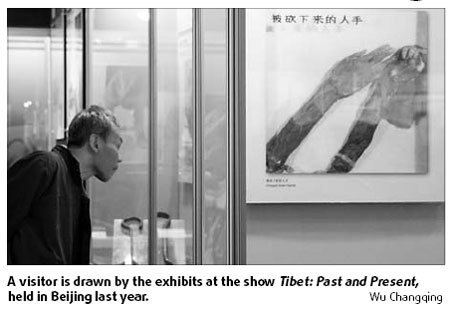
|
SHOWBIZ> Theater & Arts
 |
|
Slaves rejoice in a hard-won fight for freedom
By Liu Jun (China Daily)
Updated: 2009-03-09 10:13
 Pasang still remembers the night she decided to flee her master's house some 50 years ago. The stars shone brilliantly over her, as if they were pointing to a brighter future. It was that night she changed her name from Kelsang (Auspiciousness) to Pasang (Bright Star). Born in a family of Nangsan - the house slaves of Tibetan noble families - Pasang was destined to be a slave for her life. At 7, the girl was sent to serve the master's mother. Her duties included bringing tea upstairs and cleaning the old lady's chamber pot (toilet). She was often kept awake throughout the night. "It was a time for a young child to grow, but I had to toil day and night with hardly any sleep," recalls Pasang in her spacious study filled with books. She was the first woman to become vice-chairperson of the Tibet autonomous region's government in 1971. A few years ago, she retired from the post of vice-chairperson of the All China Women's Federation. The dramatic turn of her destiny came in 1956, when her master beat her and the 19-year-old decided to run for her life. Journeying for seven days from Lhasa, she found the People's Liberation Army and joined the construction of the Damxung airport. In the documentary Stories of Tibetan Serfs, which is been aired on China Central Television (CCTV) this week, Pasang joins other former Tibetan slaves, beggars and researchers to celebrate the tremendous changes that have taken place in Tibet over the past half a century. Jointly made by the State Council's Information Office and the CCTV, the 50-minute documentary gives a vivid account of Tibet's peaceful liberation and democratic reform in the 1950s and 60s. What makes it more convincing are rare film footages taken by both Chinese and foreign journalists at the time. In a scene recorded by British photographers in the late 1940s, Tibetan nobles rode on horses and human slaves to enjoy a journey. Along the road, serfs had to bow and stick out their tongues to show humble obedience. About the same time, the General Assembly of the United Nations adopted and proclaimed the Universal Declaration of Human Rights in Dec 1948, whose 4th article states that "No one shall be held in slavery or servitude; slavery and the slave trade shall be prohibited in all their forms". Another powerful example comes from Orphans of the Cold War: America and the Tibetan Struggle for Survival, which was written by John Kenneth Knaus in 1999. Knaus proves the United States' support of Dalai Lama and his followers from the 1950s to the mid-1970s. Besides planning the escape route for Dalai Lama in 1959, the CIA also trained Tibetans in Colorado and Saipan Island to be special agents. The CIA air-dropped troops and weapons into Tibet and Sichuan province to sabotage the democratic reform. The Tibetan noble class and high-level monks tried to resist the changes and maintain their privileges. The documentary compared Chairman Mao Zedong to Lincoln, because both men were faced with the challenge of liberating the slaves and maintaining the nation's unification. Only three days after Dalai Lama fled Tibet, the rebellions stopped and the old Tibetan Kashak government was dissolved on March 28, 1959. The documentary shows many moving scenes of how the slaves and beggars rejoiced over their hard-won freedom. "The liberation of one million serfs and slaves is a human rights movement in its true sense," says the documentary. In contrast, Tsewang Gyungmey comes from a prominent nobleman's family. Among the students in a primary school founded in the early 1950s in Lhasa, he was the only one to have servants leading his horse to school. But Tsewang Gyungmey believed everybody must earn a living with his own hands. With other young Tibetans, he went to Beijing and graduated from the Beijing Normal University, where he won the heart of a schoolmate. Zhang Tingfang says she believed their love was strong enough to conquer any difficulties, and she followed Tsewang Gyungmey back to Tibet. They both taught numerous students and her husband became the first president of Tibet University in 1983. The documentary has been translated into English, French, Spanish and other languages and will be broadcast in CCTV's foreign language channels on today, Tuesday and March 16. |